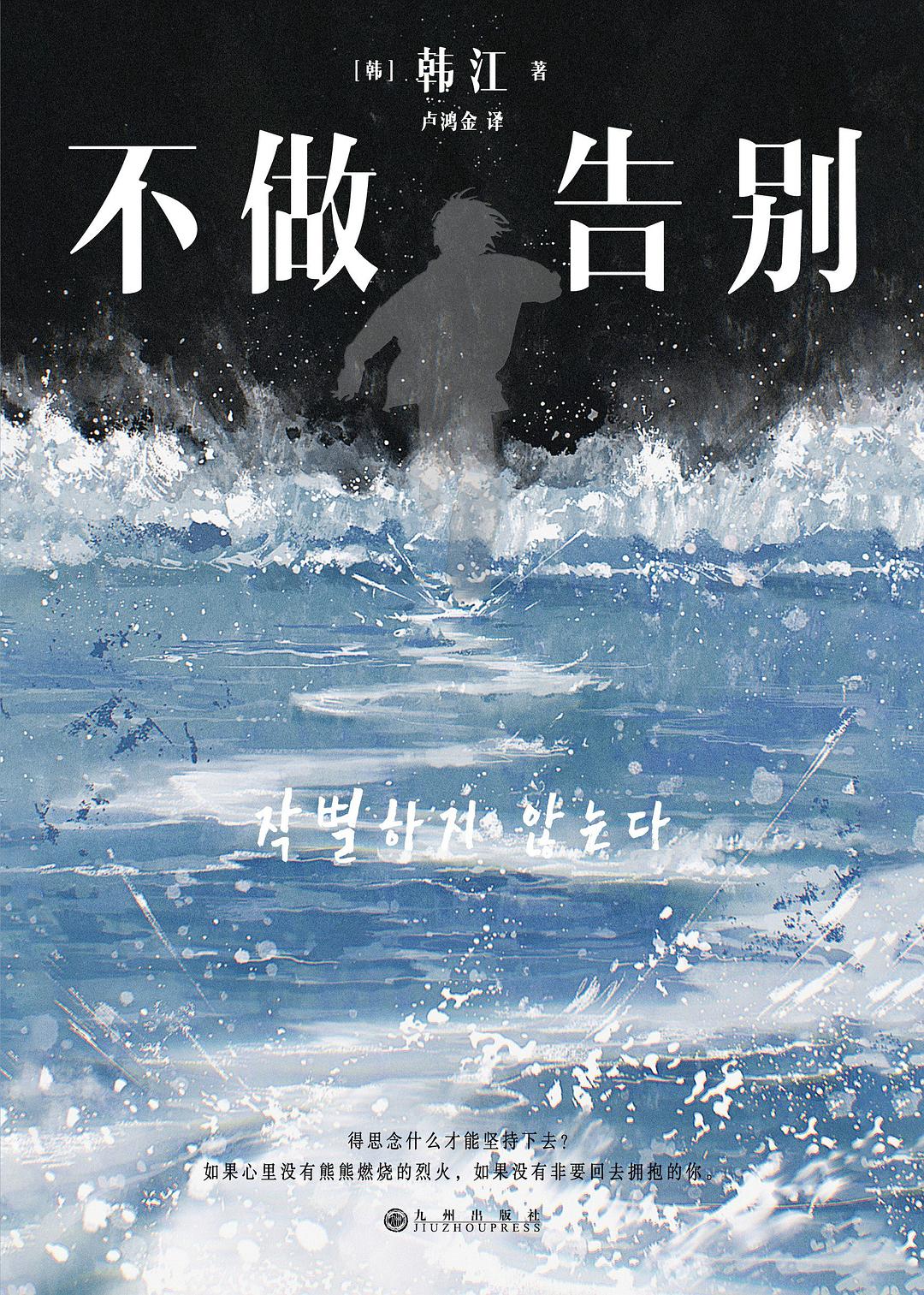1
/
of
1
No goodbyes
No goodbyes
[Korean] Hanjiang Lu Hongjin 译
Regular price
$18.99 USD
Regular price
$17.99 USD
Sale price
$18.99 USD
Unit price
/
per
Low stock
Couldn't load pickup availability
About Book
About Book
작별하지않는다
Daesan Literature Award (South Korea), Kim Man-joong Literature Award (South Korea), Samsung Ho-am Arts Award (South Korea), Medici Literature Award (France), Émile Guimet Asian Literature Award (France), winners of the Émile Guimet Asian Literature AwardHan Jiang, a long-time Nobel Prize nominee and the first Asian to win the Man Booker International Prize, writes a continuation of his life in the second half of his novel "The Boys Are Coming." He won the 2023 Medici Prize and was shortlisted for the Prix Femina.
If writing "The Boys Are Coming" was a journey of nightmares and death deep within my heart, then writing this novel was a journey from death to life. I believe this novel saved me. - Han Jiang
2 writes again about the themes of state violence and massacres, using the Jeju Island Massacre as a model.
Dedicated to our feelings, existence and conscience.
Dead babies, scattered bodies, raining bullets, saws under pillows, eyes burning with sparks and soot
3 This work, which former South Korean President Moon Jae-in cannot let go of, won the Daesan Literature Award and the Kim Man-joong Literature Award.
On those seemingly sunny afternoons, there was a heavy snowstorm in the distance; the land that we now step on safely was once stained with blood decades ago.
I couldn't let go of the novel "No Goodbye" by writer Han Jiang for a long time.
Listening to this heartfelt story, I deeply felt the loss and pain of the events. Han Jiang's characteristically delicate descriptions, dreamlike and rich with metaphor, are deeply moving. The love of a family member who endured the unjust death of a family member and the collapse of their lives is too painful and too sincere. Only extreme love can offer hope for discovering the hidden truth.
——Former South Korean President Moon Jae-in’s “No Goodbye” connects and integrates Gwangju and Jeju, mourning the bloody years buried beneath today’s life and expressing his firm determination to never say goodbye.
——Award Speech of the Dashan Literature Award This novel is a masterpiece that brilliantly combines a solid storyline with outstanding novel techniques.
This unique aesthetic ethic transcends the superficiality of grand narratives and ideological conflicts. The author does not stop at exposing and criticizing the evils of collective violence, but instead persistently pursues the core of historical experience: the representation and meaning of life. This literary spirit is truly admirable.
After a five-year hiatus, Han Jiang returns to the theme of state violence in "No Goodbye," projecting her own personal vision through a crisscross of reality and fiction. Even while depicting searing tragedy, her philosophical prose remains cold and serene, like blood-stained ice, yet it allows one to discern the traces of blood piercing through and spreading. Her characters are often fragile, like pale eggs nestled against a high wall, yet Han Jiang always imbues them with an indestructible shell, nurturing kindness and courage amidst the darkness.
While both center on political violence, if "The Boys Are Coming," constructed through multiple accounts, is a painting smeared with various colors, "No Goodbye" is like carefully brushing away the dust, recovering the painting's already faded and weathered appearance. From a distance, a layer of mist appears, yet the violence remains undiminished, and the images gradually become clearer. History has yet to turn the page, its scars still seep blood. Han Jiang's writing is always imbued with a brutal beauty, like a flower in ruins, its beauty lingering amidst the shattered walls. This is the love she offers her readers. Reading these words is like healing a collective trauma, firmly telling us—don't turn away.
Because when the snowflakes fall, we may be able to find that fragile yet tenacious flower in the midst of desolation.
——Writer Peng Shaoyu
4. Exquisite binding, a dream collaboration with renowned Korean translator Professor Noh Hong-jin, who dedicated himself to the translation. Popular illustrators Lee Quan-yu and Graciax Marquez depict dual covers from different perspectives. The outer cover depicts a boy caught in a hail of bullets, while the pearly white hot stamping recalls the boy in memory. The inner cover depicts a mournful black forest by the sea, and the hot stamping of blue and gold ink on the inner cover, like an inscription on a tombstone, pays tribute to the departed soul.
Novelist Kyung-ha has been suffering from nightmares since she wrote a book about the massacre. She had planned to make a documentary about her dreams with her photographer friend In-sun, but In-sun returned to Jeju Island to take care of her mother.
One winter day, In-sun, who was hospitalized due to an accident, asks Kyung-ha to go to her home in Jeju immediately to take care of her bird. Kyung-ha braves a snowstorm and finally arrives at In-sun's home. There, she discovers In-sun's family history, which tells the story of the Jeju Massacre, a massacre of civilians that occurred on Jeju Island more than 70 years ago.
In-sun's father, heartbroken by the loss of his entire family, spent fifteen years in prison. Her mother, having lost both her parents and her younger sister, and with her brother's fate uncertain, was left to depend on her and her sister. After the massacre, In-sun's mother, searching for her brother, waged a quiet protest for decades...
In isolated dark houses in the blizzard, under the dim candles, between light and darkness, among thousands of snowflakes falling slowly and eternally, they miss those who are no longer here.
Publication Date
Publication Date
2024-01-01
Publisher
Publisher
九州出版社
Imprint
Imprint
Motie Iron Gourd
Pages
Pages
288
ISBN
ISBN
9787522518954
share

